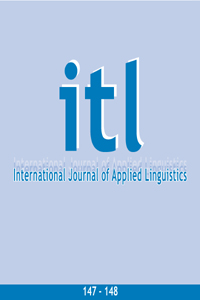 previous article in this issue previous article in this issue | next article in this issue  |

|
Document Details : Title: On the Relationship between Impulsivity/Reflectivity Subtitle: Cognitive Style and Performance on TMU English Team Author(s): REZA KIANY, G. , ALI SALIMI, E. Journal: ITL - International Journal of Applied Linguistics Volume: 143 Date: Juli 2004 Pages: 61-88 DOI: 10.2143/ITL.143.0.504646 Abstract : Performance on language tests varies as a function of various factors. These factors, according to Bachman (1990) include: communicative language ability, test method facets, personal attributes that are not related to the ability we want to measure, and random factors which are unpredictable and temporary. Since the purpose of language tests is to measure language ability and to minimize the effects of these factors, hence to maximize the reliability and the validity of the tests. This study with 1984 male and female PhD candidates with an age range of 21-51 who took the Tarbiat Modarres University (TMU) TOEFL-like English Examination as a prerequisite for their admission for PhD programs attempted to identify one of the potential sources of test bias called impulsivity / reflectivity (Imp/Ref) cognitive style. The purpose of this study was two fold: On the one hand, the present research attempted to investigate the relationships and interaction between impulsivity/reflexivity, age, sex and performance on TMu English Exam. This, on the other hand, required restandardization of Persian Impulsiveness Questionnaire in Iran. To achieve this purpose of the study, having gone through the restandardization procedures, the data obtained from 1822 subjects regarding impulsivity/reflectivity were factor analyzed through Principal Axis Factoring (PAF) and Maximum Likelihood (ML) in order to check the construct validity of the test. To achieve the main objective of the research, the subjects were classified into three groups of high, medium and low impulsives to see if this cognitive style has any relationship with Ph.D. candidates' performance on TMU English Exam. Moreover, the role of gender and age in the subjects' performance and the interaction effect of impulsivity, age and sex on their performance were taken into consideration. The results revealed that both impulsivity and gender are significant factors in the subjects' performance. The overall main effect of age an the interaction effect were found to be non significant. |


